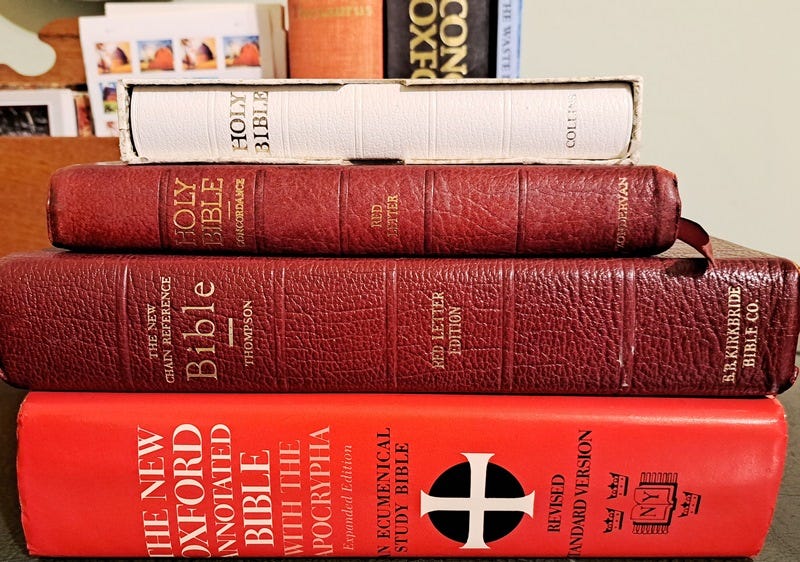A good word for the Good Book
Tidings of comfort and joy - we need them now!
The Bible remains the world’s bestselling religious text,1 but I was startled to realize how many Bibles were in my house (photo above). Only the red Oxford edition is newish - I was intrigued by an “ecumenical” Bible when I was at the Book Barn recently. The small burgundy leather-bound edition was a high-school graduation gift from a boy I had met at church prayer meetings in Virginia. The elegant white Bible came with a collection of books belonging to Carole Seymour-Jones, a British biographer. While I’m sure there is a Koran here somewhere, there’s at least one other Bible as well, a battered copy from Sears that I asked for as when I was seven or eight.
Christianity isn’t looking good these days. Influential perhaps, but not good. People who claim to follow Jesus ignore the rule of law and want to bring an end to what has been called “the beloved community,” the US experiment in democracy. Meanwhile, news reports about abuses by priests, church leaders, and missionaries keep coming.
But that’s not all there is to say about one of the world’s major religions, which has (and still does) provide a sense of purpose and meaning to many. The same is true of Islam, of course, but I’m only familiar with Christianity and the Bible, and it is still Christmas time, until Epiphany, the 6th of January. You’ll find some favorite Bible verses below, and references to third places in Christian life, too.
This chain of thought was triggered by listening to Christmas music, and by exchanges with people in China. I answered questions about what books from China would be successful with US readers (you can see one article here—it was published in Chinese but we’ve included the English text). I said that the key was to find stories that readers anywhere could relate to.2 There is plenty in the human experience that we all share, and are curious about. A great storyteller can make that leap.
This brought me to the Christmas story. A scandalous pregnancy. An impoverished young couple seeking shelter. A baby who is said to have miraculous powers (but does not evince them for many years). A jealous, murderous leader. A flight to safety in another country. Love and hatred, tenderness, violence, and sex, and a great need for hope and new leadership in a time of political oppression.
It has all the ingredients. And it’s turned out to be incredibly adaptable—providing us with the blond and blue-eyed Jesus who had pride of place in my farmer grandparents’ living room, as well as the fascinating blend I saw in churches in rural Guatemala, indigenous figures alongside the Holy Family. I know that Islam spread with remarkable swiftness across the whole of Asia, but I’m not sure it has an origin story that can compete that of Christianity. (If you disagree, or can explain their relative merits for proselytizing across cultures, please do leave a comment.)
And Jesus himself, as portrayed in the Bible, is worth a look. This is more difficult than you might guess because the New Testament starts with four different accounts of Jesus’s life. As a publisher, I frown on this. But that’s not my only complaint about the Bible. Frankly, it needs a lot of editing.
I write this as someone who has actually read the whole of the Bible. (Every damned word, I would say, about any other book.) A good bit of it should go on the cutting floor, so we could find the interesting stories and words of wisdom, and actually get the gist of what the whole thing is about. Unfortunately those who today claim to be “Bible believing” seem to pick out the meanest time- and culture-bound admonitions, which gives people the idea that the Bible is just a collection of misogyny, racism, and crackpot rules for living.
As a non-Christian, I’m really grateful that we’re hearing about President Jimmy Carter right down. His funeral on January 9th will be a good reminder of how a genuine believer talks, and lives.
And he’s not the only one. I’ve been poking around the world of Christian publishing, and was relieved to find that there are still people of faith, not just those who simply use their supposed Christianity as a cudgel.
Ray Oldenburg startled me by recommending, long before we met in person, a book called The Company of Strangers: Christians and the Renewal of America’s Public Life by Parker Palmer. Ray recommended the book because, he wrote, strangers frighten us more than ever before while communities (and third places) depend upon the successful integration of strangers. The foreword is by Martin Marty, a prominent Christian academic I later came to know through Bill McNeill and visited on several trips to Chicago. He too softened my attitude, which had become prickly and scornful, and made me see that faith has a role to play in intellectual and social life. The Company of Strangers remains one of the most thought-provoking and subtle books I know of about how we live with one another, day to day, and what public life means in terms of political well-being.
Christians have historically hoped to win converts to their faith, and there’s a good deal written today about how third places have a role in church outreach. Here are a couple of examples, that might be useful as we consider the art of persuasion. Third places have a practical role to play in promoting democracy, and should be considered by anyone who wants to persuade others. Face-to-face is far more powerful than online petitions or yet another email solicitation.
Those who believe in a “beloved community” that reflects God’s love for us need to come together and model ways that spirited public discourse can lead to understanding, if not always to total agreement. Read the whole thing: “Learning to Hear the Other” by Mike McCurry, Wesley Theological Seminary.
Sometimes inspiration comes from unlikely places. I recently stumbled upon an article published in the winter 1997 issue of the Planning Commissioners Journal (of all sources!). I think it offers important wisdom for congregations desiring vitality and growth. The essay was written by an urban sociologist named Ray Oldenburg and entitled “Our Vanishing ‘Third Places.’” What can today’s Christians learn from a 28-year-old piece written for city planners and secular authorities dealing with land use issues? Quite a lot, it turns out. . . . / I often reference this passage from the Book of Acts describing the life of those first Christians in Jerusalem: “Day by day, as they spent much time together in the temple, they broke bread at home, and ate their food with glad and generous hearts, praising God and having the goodwill of all the people. And day by day, the Lord added to their number those who were being saved” (Acts 2:46-47). I love this text because it is a supreme witness that joyful Christian fellowship is not only the vision for church life; it is also the means of missional attraction. People want to be part of a joyful fellowship. Read the rest: “On ‘Third Places’ and Why St. John the Divine Should Be One” by The Rev Dr R Leigh Spruill.
One way to serve those who are outside the church is through the concept of a “third place,” made popular by Ray Oldenburg, author of The Great Good Place. A “third place” is defined as a place where people gather for social interaction and community outside of home (“first place”) and work (“second place”). / For Christians, church is a natural third place where we gather for fellowship, love and a common bond. But for people who are not connected to Jesus, church will never be their third place. So, in order to reach the unreached, we need to learn to use the other third places that exist in our culture. / As an example of using an existing third space to reach unbelievers, we can look to Jesus Himself in His encounter with the woman at the well. During that time, the well was a type of third place where people gathered for social interaction and community. Read the rest: “How to use your community’s ‘third places’ for the gospel.”
Lines from the Bible
But for those who do not want to delve deeply, let me just offer a few of my favorite lines from the Bible. These are phrases that come to mind at odd moments, as snatches of poetry or song do.
The poet T S Eliot wrote lines about the way words echo down the years:
Footfalls echo in the memory Down the passage which we did not take Towards the door we never opened Into the rose-garden. My words echo Thus, in your mind.
Each of them speaks, I think, to something universal in the human experience. Some of these are wise, others are melodious and uplifting, and others are lines that you might find allusions to when you’re reading the news. (I noted a reference to the road to Damascus just the other day, playing on the current political situation in Syria.) These translated lines are from the King James Version, both Old and New Testaments.
Pilate saith unto him, What is truth? John 18:38
And as he [Saul > St Paul] journeyed, he came near Damascus: and suddenly there shined round about him a light from heaven.” Acts 9:3
For unto us a child is born, unto us a son is given: and the government shall be upon his shoulder: and his name shall be called Wonderful, Counsellor, The mighty God, The everlasting Father, The Prince of Peace. Isaiah 9:6
Jesus said unto them, A prophet is not without honour, but in his own country, and among his own kin, and in his own house. Mark 6:4
Where there is no vision, the people perish. Proverbs 29:18
Iron sharpeneth iron; So a man sharpeneth the countenance of his friend. Proverbs 27:17
I will lift up mine eyes unto the hills, from whence cometh my help. Psalm 121:1
Whatsoever a man soweth, that shall he also reap. Galatians 6:7
Wherefore seeing we also are compassed about with so great a cloud of witnesses, let us lay aside every weight, and the sin which doth so easily beset us, and let us run with patience the race that is set before us. Hebrews 12:1
For now we see through a glass, darkly, but then face to face. Now I know in part; but then shall I know, even as also I am known. 1 Corinthians 13:12
The Chinese are remarkable in their use of allusion, both in the formation of individual words and in exposition. A few characters can tell a whole story. But unlike other countries (Korea, Japan, Denmark, and more), China has no funding program for translation from Chinese into English (the major language for international books), even though it’s politically important in China to see Chinese books go abroad. Instead, the government funds translation by Chinese native speakers, exactly the opposite of the standard used by global publishers and the United Nations.
Some of my Chinese colleagues resist the idea that native English speakers are essential, insisting that only they can understand what the Chinese means and thus are more capable of expressing it in English. I sympathize, to some extent, and we have typically had a senior translator who reads Chinese but is a native-English speaker, working with a Chinese translator or editor. This process produces an excellent result, but it is expensive.3
Indeed, artificial intelligence is useful, but it is more likely to eliminate the need for a Chinese native translator, and not the work of the English-language translator editor.
My favorite Chinese aphorism has universal meaning: 同床异梦 “Same bed, different dreams.”
Incidentally, one of the fundamentalist Christian ideas about the Second Coming of Jesus - the end of the world as we know it - is that it can only happen when the Bible has been translated into every language. There is a whole wing of Christian activism solely devoted to translation. My cousin Cheryl was a translator missionary in Peru and thought her stomach pain was the result of her diet, until she was tested and diagnosed on a return visit to the US. I went to see her shortly before she died at 45 of ovarian cancer, and watched her parents trying to explain this as the Lord’s will. She had lined up a new wife for her husband from among her missionary friends, but I can’t say I thought she was especially keen to die and go to Jesus. I was glad to have had some time with her in those last days but I came away from convinced by her family’s faith. This is one of the promotional photos used to raise money for their mission.
The Quotations from Chairman Mao Tse-tung, known as the Little Red Book, has far out-sold it.
Not “relatable” - one of the words I dislike most. “Gifting” is another. And don’t get me started on the current habit of capitalizing both words in a courtesy sign-off. As you can see, I do not object to prepositions at the end of sentences but after years in England I somehow cannot bring myself to split infinitives.
Article in World Publishing (China) “我感兴趣的是对非中文读者有意义的图书” (“I am interested in books that are meaningful to non-Chinese readers.”).






My favorite English-language King James edition of the Christian Bible is _The Skeptic's Annotated Bible_, with annotations by Steve Wells. The end matter contains over 450 examples of the book's contradictions, all carefully cited, along with 135 citations of God's killings in the Bible. Wells has also marked passages containing such flaws as absurdity, cringeworthy expressions of injustice, cruelty, violence, intolerance, misogyny, strange sex portrayals such as that between Lot and his two daughters, conflicts with science and history, and homophobia (though far less of the latter than modern-day fire-and-brimstone televangelists spew). Wells also marks passages that propound sounds ethics, or "good stuff," though that is heavily outweighed by boatloads of bad stuff.
More than a century ago, the pioneer French sociologist Emile Durkheim persuasively argued that religion is a construct of human societies and cannot be adequately analyzed outside of real-world societal contexts. To be sure, as a literary historian and critic, I would argue that the most prominent genre within the farrago of mostly odd components of the Bible is historical fiction (certainly not history)--along with prophecies by mostly God-intoxicated men, myths, poetic verse, prayers, genealogy, and a few other minor genres.
In more recent times, the skeptical magician James Randi offered something like a million dollars to anyone who could demonstrate in public that the paranormal or supernatural actually existed. All of the various paranormal con artists who tried to do so failed miserably in practice, and the prize unsurprisingly remain unclaimed during the rest of Randi's life.
Quite a lot of what I had to say about translation got into this article in the Global Times, a Chinese newspaper published in English. https://www.globaltimes.cn/page/202501/1326729.shtml